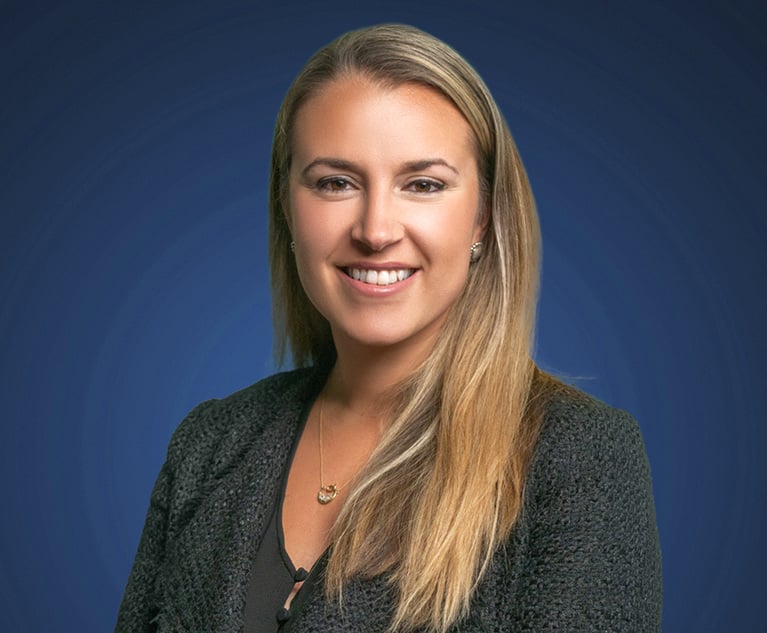 Shutterstock.com
Shutterstock.comCourt Likens Health Care Co.'s Bid to Avoid Class Arbitration to 'Forum-Shopping'
A home health care provider's attempt to avoid arbitrating a proposed class action suit "smacked of forum-shopping," a Pennsylvania judge has told the state Superior Court.
October 25, 2017 at 04:10 PM
4 minute read
A home health care provider's attempt to avoid arbitrating a proposed class action suit “smacked of forum-shopping,” a Pennsylvania judge has told the state Superior Court.
Montgomery County Court of Common Pleas Senior Judge Joseph Smyth issued an opinion Monday outlining his reasoning for rejecting Salman Corp.'s request to have a court, rather than an arbitrator, determine whether a wage-and-hour suit should proceed to class arbitration. The Montgomery County-based home health care services provider has appealed Smyth's decision to the Superior Court.
As part of his reason for rejecting the company's bid to have a Montgomery County judge decide whether the claims should be arbitrated, Smyth said that, not only did the company's request come too late, but bringing the issue to the Montgomery bench when the case was already on the docket in Philadelphia court “smacked of forum-shopping.”
“The thinking animating this court's ruling was that if [the company] had issues with or objections to the way the arbitrator was conducting the arbitration [the company] had sought and been granted in the Philadelphia Court of Common Pleas, or whether it could proceed as a class action (as it had in the Philadelphia court), they should have gone back to that court, in which the case was still open and stayed pending the arbitration, to ask that court to clarify whether class arbitration was intended or whether the arbitrator could decide the issue,” Smyth said in the 16-page opinion.
Buchanan Ingersoll & Rooney attorney Jill Lashay, who is representing Salman Corp., said she disagreed with the court's use of the term “forum-shopping.” She said the Montgomery County court had previously addressed issues related to the case and the defendants regarded the proceedings in Philadelphia as having been closed.
“We clearly filed in Montgomery County because we determined that was the proper place to file. As far as we were concerned the matter in Philadelphia Common Pleas was closed,” Lashay said. “The court has jurisdiction to decide whether or not there was the ability for a class to be brought. That is what we will continue to argue at the appellate level.”
Winebrake & Santillo attorney Pete Winebrake, who handled the case with Mark Gottesfeld, said the ruling is significant because it wades into an unsettled area of the law at a time when more cases are proceeding to arbitration.
“If a defendant is going to move to compel arbitration of a class action lawsuit, and the defendant thinks that a judge should decide the propriety of class arbitration, then the defendant should make that position known at the beginning, and not wait until it's already in arbitration,” Winebrake said.
According to Smyth, Corrine Broach first sued Salman Corp. in the Philadelphia Court of Common Pleas for allegedly violating the Pennsylvania Minimum Wage Act. Salman Corp. sought to compel arbitration, and the court, without objection from Broach, ordered the case to be arbitrated with the American Arbitration Association.
Smyth noted that, although the arbitration policy at issue in the case required disputes to be arbitrated, the policy did not explicitly state whether disputes could be arbitrated on a class action basis.
Smyth said the proceedings in Philadelphia had been stayed pending the arbitration, and the case remained on the docket.
The arbitration proceedings began in January 2016, but, after several conferences, the defendants announced for the first time that they planned to file a motion for declaratory judgment regarding whether a court or arbitrator should determine if the case could proceed to class arbitration.
The arbitrator already involved in the case ultimately denied Salon Corp.'s attempts to have the Montgomery County court decide the class arbitration issue.
Smyth said that most of the case law the parties cited was not binding on the court, but he largely adopted the findings of the arbitrator, who had said Salman Corp.'s request was “both too late and too inconsistent with the prior history of the case to be condoned.”
Max Mitchell can be contacted at 215-557-2354 or [email protected]. Follow him on Twitter @MMitchellTLI.
This content has been archived. It is available through our partners, LexisNexis® and Bloomberg Law.
To view this content, please continue to their sites.
Not a Lexis Subscriber?
Subscribe Now
Not a Bloomberg Law Subscriber?
Subscribe Now
NOT FOR REPRINT
© 2025 ALM Global, LLC, All Rights Reserved. Request academic re-use from www.copyright.com. All other uses, submit a request to [email protected]. For more information visit Asset & Logo Licensing.
You Might Like
View All

3rd Circuit Strikes Down NLRB’s Monetary Remedies for Fired Starbucks Workers

Trending Stories
- 1You Too Can Be a Programmer: Connecting to Legal Platform APIs With Generative AI (Part 2)
- 2Court of Appeals and Appellate Division As Courts of First Instance
- 3Federal Judge Slaps Down the SEC’s Attempt to Regulate Crypto Liquidity Providers
- 4A Client Is Guilty; But Another Man Is Wrongfully Convicted
- 5Legal Tech's Predictions for Cybersecurity in 2025
Who Got The Work
Michael G. Bongiorno, Andrew Scott Dulberg and Elizabeth E. Driscoll from Wilmer Cutler Pickering Hale and Dorr have stepped in to represent Symbotic Inc., an A.I.-enabled technology platform that focuses on increasing supply chain efficiency, and other defendants in a pending shareholder derivative lawsuit. The case, filed Oct. 2 in Massachusetts District Court by the Brown Law Firm on behalf of Stephen Austen, accuses certain officers and directors of misleading investors in regard to Symbotic's potential for margin growth by failing to disclose that the company was not equipped to timely deploy its systems or manage expenses through project delays. The case, assigned to U.S. District Judge Nathaniel M. Gorton, is 1:24-cv-12522, Austen v. Cohen et al.
Who Got The Work
Edmund Polubinski and Marie Killmond of Davis Polk & Wardwell have entered appearances for data platform software development company MongoDB and other defendants in a pending shareholder derivative lawsuit. The action, filed Oct. 7 in New York Southern District Court by the Brown Law Firm, accuses the company's directors and/or officers of falsely expressing confidence in the company’s restructuring of its sales incentive plan and downplaying the severity of decreases in its upfront commitments. The case is 1:24-cv-07594, Roy v. Ittycheria et al.
Who Got The Work
Amy O. Bruchs and Kurt F. Ellison of Michael Best & Friedrich have entered appearances for Epic Systems Corp. in a pending employment discrimination lawsuit. The suit was filed Sept. 7 in Wisconsin Western District Court by Levine Eisberner LLC and Siri & Glimstad on behalf of a project manager who claims that he was wrongfully terminated after applying for a religious exemption to the defendant's COVID-19 vaccine mandate. The case, assigned to U.S. Magistrate Judge Anita Marie Boor, is 3:24-cv-00630, Secker, Nathan v. Epic Systems Corporation.
Who Got The Work
David X. Sullivan, Thomas J. Finn and Gregory A. Hall from McCarter & English have entered appearances for Sunrun Installation Services in a pending civil rights lawsuit. The complaint was filed Sept. 4 in Connecticut District Court by attorney Robert M. Berke on behalf of former employee George Edward Steins, who was arrested and charged with employing an unregistered home improvement salesperson. The complaint alleges that had Sunrun informed the Connecticut Department of Consumer Protection that the plaintiff's employment had ended in 2017 and that he no longer held Sunrun's home improvement contractor license, he would not have been hit with charges, which were dismissed in May 2024. The case, assigned to U.S. District Judge Jeffrey A. Meyer, is 3:24-cv-01423, Steins v. Sunrun, Inc. et al.
Who Got The Work
Greenberg Traurig shareholder Joshua L. Raskin has entered an appearance for boohoo.com UK Ltd. in a pending patent infringement lawsuit. The suit, filed Sept. 3 in Texas Eastern District Court by Rozier Hardt McDonough on behalf of Alto Dynamics, asserts five patents related to an online shopping platform. The case, assigned to U.S. District Judge Rodney Gilstrap, is 2:24-cv-00719, Alto Dynamics, LLC v. boohoo.com UK Limited.
Featured Firms
Law Offices of Gary Martin Hays & Associates, P.C.
(470) 294-1674
Law Offices of Mark E. Salomone
(857) 444-6468
Smith & Hassler
(713) 739-1250






